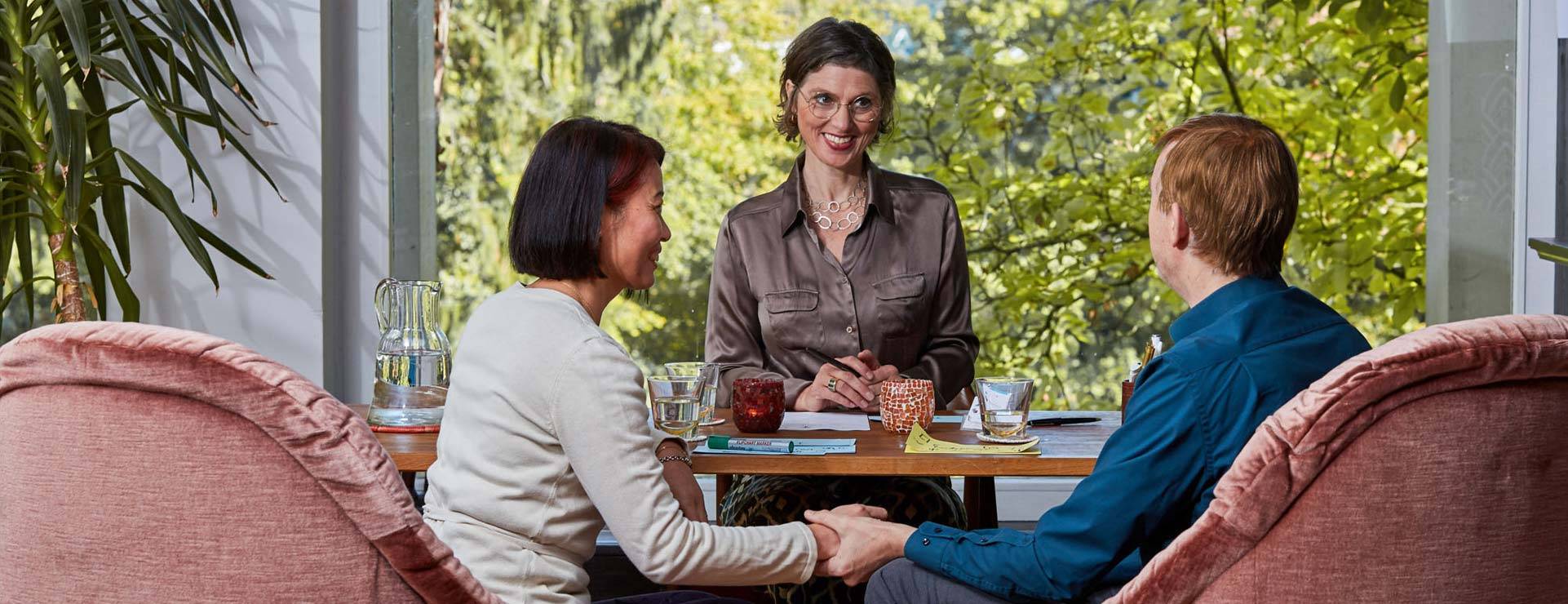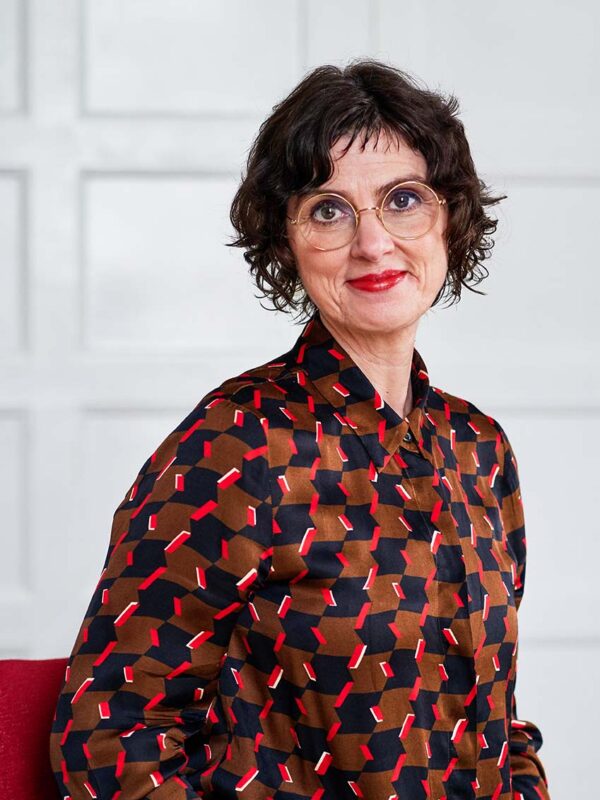Mediation for couples and families
Perception - Change of Perspective - Transformation
Conflicts between family members are particularly distressing. While some are caused by genuine hardship, others derive from misunderstandings, that is to say, lack of communication. Such conflicts arise in all contexts and over many different matters:
- Within families (also patchwork families), and between relatives
- Between married couples and in partnerships (also same-sex)
- Amonst friends or neighbours and in private action groups
- Between the generations, e.g., between parents and grown-up offspring, or grandparents and grandchildren
- Inheritance disputes: the goal should be a calm, fair and objective settlement of the estate. clarification of expectations and disappointments (sometimes unexpressed), and peaceful overcoming of long-standing family tensions
Resolving conflicts in relationships, settling disputes
In a mediation we aim to break habitual patterns in a protected discussion setting. At the same time we build up a clear overall picture of the personal and concrete issues concerning the relationship and partnership. This then provides help with a decision concerning a possible separation or divorce.
As a registered mediator I lay down a clear framework. All those involved express their expectations and views. This creates clarity and is the basis for working out a solution founded on mutual respect. This voluntarily accepted framework of trust enables conflicts in relationships to be defused, particularly following escalation.
If you are faced with the challenge of resolving relationship questions, if a separation or divorce is a possibility, or if there are disagreements between the generations – why not take advantage of the instrument of family mediation or dispute settlement?
Benefits of family and divorce mediation
- Protected discussion environment for conflict settlement
- Avoidance of escalation in relationship conflicts
- Relieving the burden on third parties, e.g., children
- Constructive solutions for all involved, e.g., in the case of imminent divorce
- Restoration of channels of communication and discussion for couples and between generations
- Long-term benefits through relationship counselling
Counselling for marriage and partnership conflicts
A fulfilling relationship, partnership or marriage depends on many personal factors, notably on how the partners perceive each other and the extent to which they talk and engage in exchange. The original cause of a disagreement often lies some time back and is not always equally recognized by both partners.
Establishing the causes of conflicts in relationships
Lack of opportunity to talk can contribute to relationship problems, and so can underestimation of the value of talking. The following are just some areas in which conflicts can arise.
- Manner and depth of communication: verbal/non-verbal, feedback, criticism, praise, respect, affection ...
- Character traits: intraversion/extraversion, conscientiousness ...
- Concrete factors: living, time for each other, children, looking after parents, occupational circumstances ...
- Personal factors: psychological and physical health
- Level of mutual trust: history of the relationship, conflicts in the past
If recurrent disagreements are to be resolved, it is vital to pursue a holistic approach, which I work out in collaboration with all involved. The focus lies on the restoration of communication. Methods tried and tested over the years aim at the mutual acknowledgement of such experiences as hurt or disappointment.
In many cases, one of the most important goals is to revive vital resources such as finding time for each other, getting help with looking after children, or taking account of difficult circumstances. This often makes a difference to how the main problems are perceived – regardless of whether the couple separates or not.
Mediation helps those involved to recognize the original causes of a conflict and to see the associated factors more clearly. Furthermore, as a modern form of dispute settlement, mediation helps in the sorting out of past problems and leads to actions that will lay the ground for a happy relationship in the future.
- Relationship counselling & dispute settlement
- Counselling for families and couples (also intercultural)
- Divorce mediation
- Overcoming generation conflicts
I have many years of experience as a mediator. In my work, I listen closely to all involved, in order to appreciate individual concerns and points of view. In family mediation I use resources from the field of marriage and partnership counselling, for example, parts of the “Imago Dialogue”, elements of nonviolent communication (NVC), and many others. Regardless of whether it is applied to a marriage, a life partnership (heterosexual or same-sex), or any other form of longer-term personal relationship, mediation offers or leads to:
- Help in dealing with conflict-laden aspects of everyday life
- Assistance in the resolution of recurrent distressing conflicts
- The development of communication techniques for dealing with future conflicts
- All-round improvement in the quality of the relationship
In the case of deeper-lying psychological problems, a mediation is no subsitute for relationship therapy but it can play a valuable complementary role.
Communication is particularly important in bi-national partnerships and patchwork or intercultural families. And more specifically, so is understanding the culture that is not one’s own. In a mediation we clarify the extent to which cultural factors may be contributing to a given conflict. These factors may have to do with:
- Differences in values and attitudes about, for example, family relationships, hierarchies, origins, religion
- Habits regarding such things as orderliness or time
- Basic assumptions about social roles: man/woman, relatives, age
- Norms and rules: who or what deserves respect or loyalty, who or what is entitled to hold authority
- Behaviour in conflicts, for example, avoidance of open confrontation
Most important of all is a conscious and careful approach to the field of culture and cultural habits or special characteristics. Culture does not necessarily play a role but it certainly can. As mediator, I collaborate with the parties on working out where and in what areas cultural factors may be generating conflict, and how they can best deal with the conflict in question.
It goes without saying that this approach is firmly founded on absolute respect for all cultures and nationalities, without exception.
In the case of an imminent divorce or separation, what I offer as a mediator is a form of relationship counselling. For married couples or life partners, this offers many new possibilities in the form of assistance with:
- Sorting out whether divorce or separation is the only solution
- Preparation of a legal divorce settlement founded on mutual agreement
- Clarifying the practical consequences of divorce or separation: places of residence, alimony, dividing up of shared assets and household items
- Coming to agreements on question related to the children: custody, exercise of right of contact, alimony, education and upbringing after the divorce or separation
Social relationships between different generations have hazards of their own. Clashes between different values, communication styles, expectations and needs are perfectly normal. But they may be difficult to cope with.
Additional complicating factors include living in close proximity, illness, high-pressure situations in school or at work, new family members, bereavement, or transition phases such as puberty. Mediation offers numerous possibilities.
- Between parents/legal guardians and children/young people: clarification and rapprochement through the conscious identification of unexpressed resentments, or coming to clear agreements about everyday life
- Generation conflicts amongst grown-ups: questions of communication, working out agreements on how to get on with one another, for example, contact with children or grandchildren, upbringing, financial support and gifts, personal participation in family life
- When parents, elderly or otherwise, need special care: dispute settlement and conflict resolution in spite of often difficult circumstances
Only those who have good knowledge of what is foreign and of themselves can achieve agreement in a thousand discussions.
AFTER AN OLD CHINESE SAYINGFamily mediation
Children need clarity
Children need happy parents – and even if a relationship, partnership or marriage is coming to an end, parenthood does not. Children need peaceful and clear circumstances in order to develop healthily. In such cases, it is important to create clarity regarding custody, alimony and contact rights. These are central themes – especially when a divorce or separation looks inevitable.
Separation and divorce mediation provides valuable assistance on questions related to custody (also shared custody). The points to be settled are the child’s or children’s principal place of residence, contact rights (sometimes across national borders), and other questions such as alimony and special needs. In the framework of family mediation or dispute settlement these questions are usually settled to the complete satisfaction of those involved.
My role as a mediator also extends to keeping a special eye on the interests of minors. I always draw attention to their point of view when the parents or members of other generations are too busy battling with their own burdens. If desired, we conclude by holding a session with the younger generation or by deciding upon the best way of communicating with them.
In such cases we give full recognition to the agreement concluded by the parents, which we convey to the children in a way appropriate to their age. This comes as a relief to all and leads to the clarity that is our goal.
State-subsidized (co-)mediations
Fees for private family mediation in Vienna and the surrounding area
The rates quoted are for 60 minutes.
Evening (from 6 p.m.) and weekend appointments: 30 per cent supplement
A mediation session lasts between 90 minutes and two hours.
Mediation session for families or couples and for generation conflicts: €180 per hour. Please feel free to ask about the possibility of a social rate or state-subsidized family mediation. TARIFTABELLE_-_neu
Group rate (three or more persons): €200 per hour, €250 for 10 or more persons
Co-mediations: €250 per hour
Depending on the matters in hand and the degree of conflict in the relationship, the whole process lasts on average for between 6 and 10 sessions. Some matters can be dealt with in a single session. In other cases, the parties require longer-term assistance.
The procedure is always solution-oriented and related to the specific matter in hand, which we establish together in the first session.
The mediation sessions take place at my practice, Heuberggasse, 1170 Vienna, or by agreement at another neutral location.

